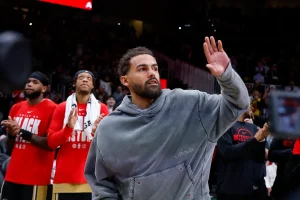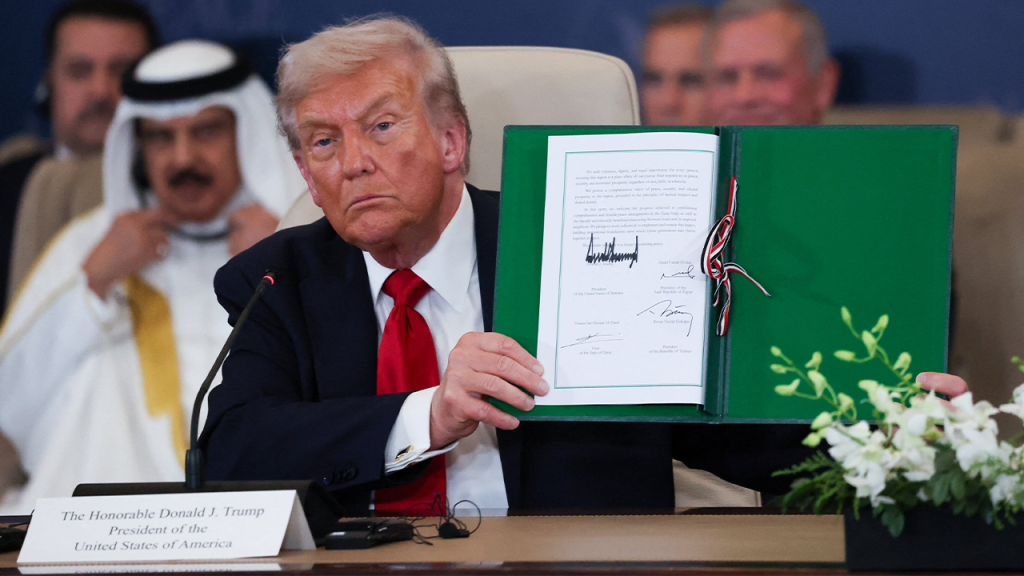Trump’s Diplomatic Breakthrough in Middle East Reveals Shifting Alliances
In a remarkable turn of events at the global summit in Egypt’s Sharm el-Sheikh, former President Donald Trump orchestrated what many are calling a diplomatic breakthrough in ending the protracted Hamas-Israel conflict. While addressing the assembly of world leaders gathered to discuss the future of war-ravaged Gaza, Trump subtly criticized certain attendees for their counterproductive roles in the peace process. When questioned about which world leaders he viewed as ineffective, Trump diplomatically refrained from naming names, stating, “I won’t comment on that. But you know probably who they are… There were a couple in the room.” This veiled rebuke highlighted the shifting landscape of Middle Eastern diplomacy and America’s changing perspective on which international partners are genuinely constructive in achieving regional stability.
What stood out during the summit was Trump’s pattern of acknowledgments – expressing gratitude primarily to Turkish President Recep Tayyip Erdoğan, Qatar, and Egypt, while notably omitting traditional Western allies from his praise. This omission did not go unnoticed, particularly as several Western leaders appeared eager to claim partial credit for the diplomatic achievement. In a particularly pointed exchange, U.S. Ambassador to Israel Mike Huckabee forcefully rejected Britain’s Education Secretary Bridget Phillipson’s claim that the UK had “played a key role behind the scenes in shaping this” peace agreement. Huckabee bluntly responded on social media: “I assure you she’s delusional. She can thank @realDonaldTrump anytime just to set the record straight.” The incident highlighted growing tensions between the U.S. and some of its traditional allies regarding Middle East policy, with Trump’s administration seemingly favoring regional powers over European partners in resolving the conflict.
Relations with European leaders appeared particularly strained, as evidenced by Trump’s past criticism of French President Emmanuel Macron for his initiative to recognize a Palestinian state. Trump had previously dismissed Macron’s diplomatic efforts with the brusque assessment that “what he says doesn’t matter.” Observers at the summit noted an awkward 26-second handshake between the two leaders, visually representing the diplomatic tension. Secretary of State Marco Rubio had similarly criticized Australia, Canada, Britain, and France for recognizing a Palestinian state, arguing that such recognition “emboldens” Hamas and makes ending the conflict more difficult. This perspective was echoed by retired British Colonel Richard Kemp, who pointedly observed on social media: “Tonight Trump name-checked countries that played a significant role in peace agreement. UK not included. Nor was France, Canada or Australia, the ‘recognisers.'”
Richard Goldberg, a senior advisor at the Foundation for Defense of Democracies and former National Security Council official, offered a blunt assessment of why Trump’s approach succeeded where others had failed. “We know for a fact that Hamas would pull back over and over again whenever there was a prospect of a U.N. Security Council action to pressure Israel, when Britain or Canada would announce an arms embargo on Israel, when French President Emmanuel Macron would organize a push for Palestinian state recognition,” Goldberg told Fox News Digital. “This is happening right now in spite of all them because of one man who said to their faces in front of the world, I don’t give a damn what you say or do, I will help Israel open the gates of hell unless the hostages come home now.” This analysis suggests that Trump’s willingness to apply decisive pressure, rather than pursue multilateral diplomatic initiatives favored by European allies, proved to be the key factor in breaking the diplomatic deadlock that had prolonged the conflict.
Despite the apparent tensions with traditional Western allies, there were some efforts to acknowledge their contributions. Special envoy Steve Witkoff later thanked the UK’s national security advisor in a social media statement, recognizing “the vital role of the United Kingdom in assisting and coordinating efforts” and particularly praising “the incredible input and tireless efforts of National Security Advisor Jonathan Powell.” However, this acknowledgment appeared somewhat at odds with the broader narrative emerging from the summit. Hillel Neuer, Executive Director of UN Watch, offered a more critical perspective on the international community’s role, stating: “Israel is finally seeing the hostages come home, and perhaps the guns fall silent. But let the world remember: this could have ended long ago if many around the world — from U.N. officials to so-called human rights groups like Amnesty International — had not spent two years justifying Hamas instead of confronting it.”
German Chancellor Friedrich Merz also faced criticism for attending the summit, with German media suggesting he was attempting to capitalize on Trump’s diplomatic success despite having previously imposed a weapons embargo on Israel’s military. Julian Reichelt, editor-in-chief of the conservative news outlet NIUS, accused Merz of having “supplied Hamas with air support while simultaneously denying Israel the weapons it needed to fight Hamas,” referring to Germany’s decision to send humanitarian aid via airlift deliveries to Gaza while restricting military support to Israel. The criticism highlighted a broader tension in international responses to the conflict – between humanitarian concerns for Palestinian civilians and security support for Israel – and suggested that some leaders were now attempting to reposition themselves in light of Trump’s diplomatic breakthrough. As the region moves toward what many hope will be a lasting peace, these shifting alliances and diplomatic tensions may well shape the implementation of any agreement and determine whether stability can be maintained in this historically volatile region.














